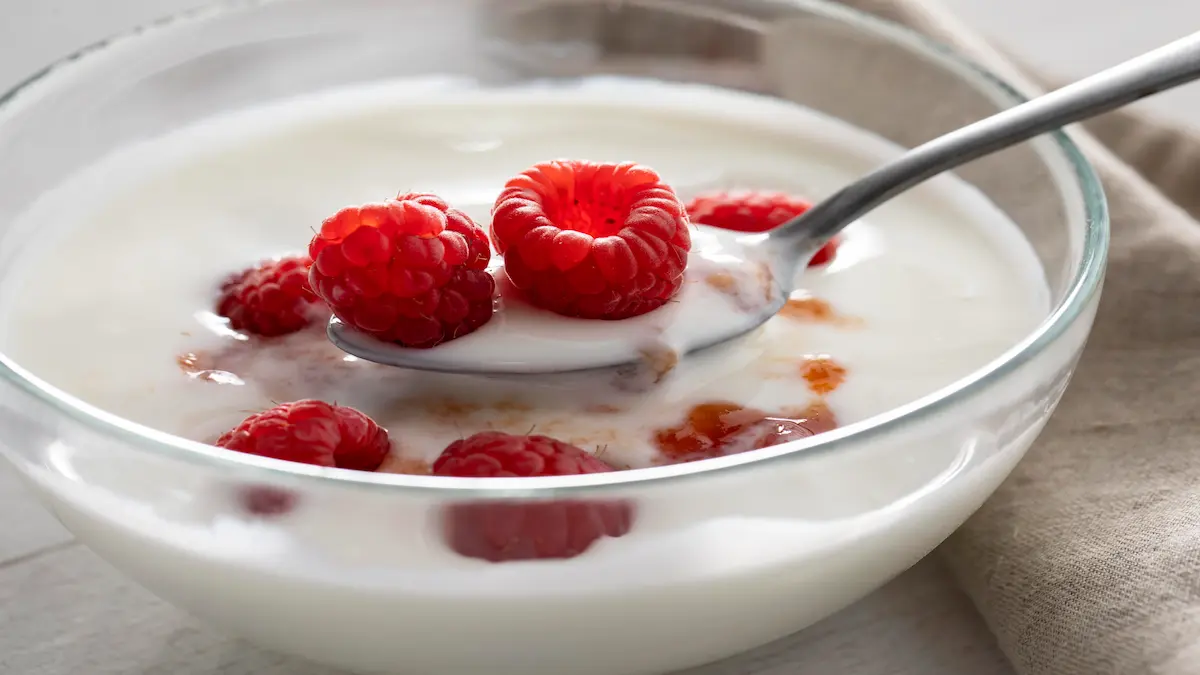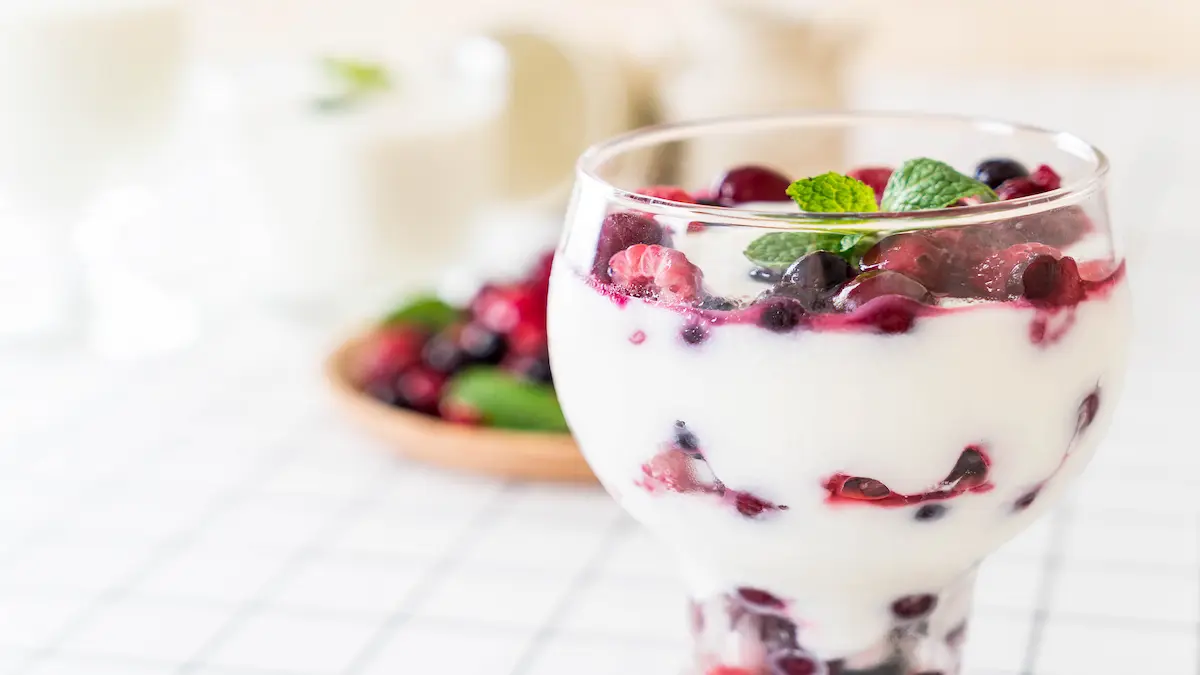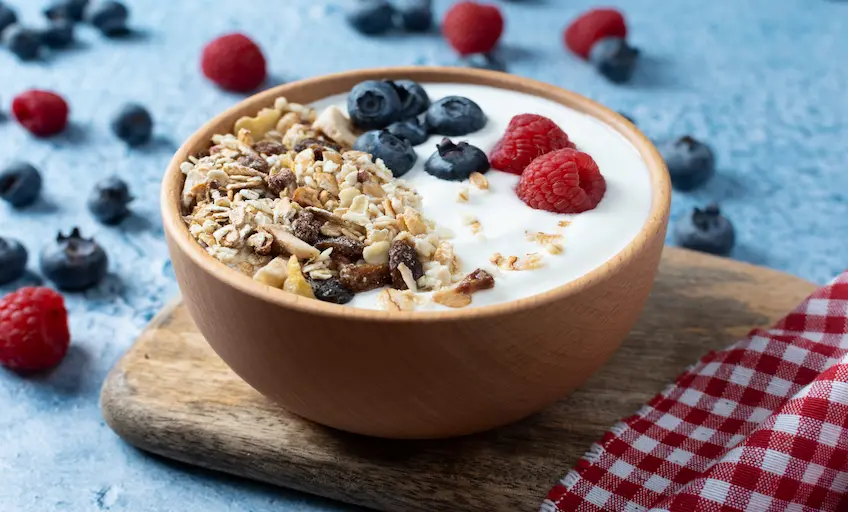Looking for a delightful twist to your weight management journey? Say hello to curd—your creamy, gut-friendly secret weapon! Packed with protein, probiotics, and weight-busting benefits, it might just be the delicious boost your diet needs.
Nutritional information of curd

Here’s a quick look at the nutritional profile of curd and how its key components support healthy weight management.
| Nutrient | Amount per 100g | % Daily Value |
| Energy | 98 kcal | 5% |
| Calories | 98 kcal | 5% |
| Carbohydrates | 4.7 g | 2% |
| Protein | 11 g | 22% |
| Fat | 4 g | 6% |
| Potassium | 141 mg | 3% |
| Sodium | 50 mg | 2% |
| Calcium | 120 mg | 12% |
| Vitamin A | 100 IU | 2% |
| Cholesterol | 15 mg | 5% |
Nutritional benefits of curd
Curd is rich in essential nutrients that promote overall health.
Protein in curd
Curd contains a high protein level of 10–12 grams, depending on the type, alongside its calorie content. Our bodies’ growth and development depend on a protein-rich diet. As dry milk is often used, commercially available curds may contain more protein than homemade curd.
Carbohydrates in curd
The main sugars found in curd are lactose and galactose. During fermentation, bacteria break down lactose, yielding glucose and galactose, which are then converted into lactic acid, imparting a sour flavour to curd and other fermented dairy products. Since curd has fewer carbohydrates than milk, it is a great addition to a ketogenic diet.
Additionally, curd is an excellent option for those on a diet, as it typically contains only three per cent of its calories from carbohydrates. Natural curd contains very little sugar. However, the curd available in supermarkets differs in nutrient and sugar content, which may sometimes do more harm than good. The curd sold as fruit or flavored is generally high in sugar. Avoid these and opt for only natural and home-prepared curd for weight management.
Minerals in curd
The two main mineral groups you should obtain from the mineral composition of curd are potassium and calcium. Compared to milk, the levels of these two minerals in curd are lower.
Calcium in curd
Calcium keeps bones and teeth healthy. The high calcium levels in curd enable quick and easy absorption by the body. Furthermore, it assists with muscle contraction and blood clotting.
Potassium in curd
One of the two primary mineral groups is the potassium group. Our bodies contain potassium, which helps in the efficient functioning of the nervous system and muscle contraction. Furthermore, it helps to eliminate toxins from the cells and transports nutrients into them.
Vitamins in curd
Riboflavin, vitamin B6, vitamin B12, vitamin A, vitamin C, and pantothenic acid are the key vitamins found in curd. These vitamins assist your body in maintaining health by providing essential micronutrients within dairy products.
Curd for weight management
Is curd good for weight management? Here are some characteristics of curd that you should be aware of if you’re considering it:
Lactose-free option
When it comes to weight management, incorporating milk into your diet could be beneficial for your low-fat eating habits. However, as milk contains lactose, lactose-sensitive individuals may find it challenging to include it in their diet. On the other hand, curd is produced by fermenting milk by adding a bacterium known as Lactobacillus bulgaricus. This bacterium converts the lactose in milk into lactic acid, making curd suitable for consumption by lactose-intolerant individuals.
Helps in muscle preservation
If you exercise regularly, curd helps repair and rebuild muscles, ensuring you remain active and energized during your weight management journey. Having 4 grams of protein per 100g, curd is particularly beneficial after a workout to promote recovery, reduce muscle soreness, and enhance muscle growth.
Enhances metabolic rate
Did you know that curd can give your metabolism a little boost? Thanks to the probiotics, it keeps your gut happy, and a healthy gut means better digestion and calorie burning. Moreover, the protein in curd helps your body work harder to digest it, enhancing your metabolic rate.
Reduces appetite
Protein is abundant in curd. It helps reduce calorie intake while satiating hunger and preventing binge eating. Curd is an excellent afternoon snack due to its high protein content. You can eat curd between meals.
The more protein in curd, the more it aids in controlling appetite. GLP-1, peptide YY, and cholecystokinin are appetite-reducing hormones that receive a boost from protein intake. Conversely, it decreases ghrelin, the hunger hormone.
Vitamin-rich
Curd isn’t just tasty—it’s also packed with essential vitamins! From B12 for energy and brain health to vitamin D for strong bones and immunity, curd offers a nutritious boost in every spoonful.
Low in calories
Curd is surprisingly low in calories, making it a wise choice for those watching their weight. You can enjoy a satisfying, nutrient-rich snack without adding extra calories—ideal for keeping cravings at bay while staying on track!
Calcium for fat regulation
Curd, an effective fat burner, may be a staple dish for those wishing to eliminate abdominal fat. Furthermore, its richness in minerals, particularly calcium, supports weight loss by boosting metabolism and decreasing dietary fats. Increasing dairy or calcium intake promotes a sense of satisfaction and helps to reduce dietary fat consumption when managing weight.
Probiotics for gut health
The probiotics present in curd foster a healthy gut microbiome. A balanced gut aids in better digestion, nutrient absorption, and weight management.
High in protein
In contrast to milk, curd is produced through fermentation, which isolates the milk solids from the liquid, resulting in a product that is more concentrated and contains higher protein levels than milk itself. As proteins are more difficult to digest, curd’s elevated protein content accounts for the slower digestion rate.
Packed with essential minerals
You may manage weight due to a hormone linked to elevated blood pressure. However, blood pressure levels are regulated because beneficial minerals such as potassium and magnesium in curd facilitate the removal of excess water from the cells, enabling it to quickly reach the bladder.
Contains vitamin A
Contrary to popular belief, vitamin A does not have an immediate impact on your weight issues. However, it may only influence weight maintenance indirectly. For example, incorporating vitamin A into your diet can reduce your risk of heart disease, one of the leading causes of weight gain and high blood pressure.
Incorporate curd for weight management
Incorporating curd into your meals correctly can enhance both the flavor and nutrition of your diet.
- Begin your day with a hearty breakfast of curd topped with fresh fruit and a sprinkle of almonds for added texture and nutrients.
- Enjoy a refreshing raita with your main meal for a satisfying lunch. Combine grated cucumber, tomatoes, and spices with curd to create a delicious accompaniment.
- Prepare a smoothie with curd and your favorite fruits as an afternoon snack, or create a nutritious dip for whole-grain crackers. To balance the richness of the main course, use curd-based gravies like kadhi or buttermilk.
- Additionally, marinating meats or paneer in curd before grilling or cooking enhances tenderness and flavor.
- For dinner, enjoy a warm bowl of vegetable dalia or khichdi topped with a dollop of curd. This aids digestion while also adding creaminess. Curd can even be used in desserts. Prepare a tasty and healthy shrikhand or lassi to satisfy your sweet cravings.
Delightful curd recipes
Here are a few simple and delectable ways to enjoy curd:
Curd smoothie

Blend curd with your favorite fruits and a touch of honey for a refreshing drink.
Spiced curd
Add a dash of salt, pepper, and cumin powder to curd for a savoury snack.
Curd salad
Combine curd with cucumbers, carrots, and lemon juice for a nutritious side dish.
A wholesome addition to your diet
Curd is an effective addition to any diet. Its versatility enables easy integration into various cuisines, making it an ideal choice for individuals attempting to manage their weight. Therefore, if you’re looking to manage your weight, ensure you include curd in your diet for wholesome, delicious, and filling meals that also contribute to a healthier lifestyle!
FAQs about curd for weight management
Got questions about how curd helps with weight management? We’ve got you covered.
- How much curd is good for weight management?
A daily cup of curd increases your body’s calcium levels, which reduces the release of cortisol and aids in weight loss. Additionally, curd preserves one-third of lean muscle mass, helping you maintain your physique after losing weight for a longer period.
- What are the disadvantages of eating curd?
Excessive consumption of curd may result in weight gain instead of weight loss. This is a common side effect associated with curd. Furthermore, it may exacerbate constipation rather than improve your digestive system. Likewise, regular intake of curd might lead to discomfort for those suffering from arthritis.
- Which is better for weight management: milk or curd?
Both milk and curd are healthy. Curd is, however, more nutritious than milk due to its high content of protein and vitamins. Curd can be included in your daily diet as lassi, raita, or curd rice.
- Can curd make you gain weight?
Curd is a healthy, protein-rich food that supports digestion, immunity, and bone health while being relatively low in calories, making it great for weight management. However, sweetened or flavored curd with added sugars, or consuming it in excess, can lead to weight gain. Moderation is key to enjoying its benefits.
- Should I eat curd at night for weight management?
Curd tastes finest when consumed during the day. Therefore, according to Ayurveda, curd should not be eaten at night. Eating curd during the day helps reduce junk food intake, as it keeps one feeling full for longer. However, those with no issues related to a cold or cough may include curd in their meals, even at night.
- Is flavored curd good for weight management?
Not really. Flavored curds often come packed with added sugars and preservatives, which can sneak in extra calories and undermine your weight-loss goals. For the best results, stick to plain curd and add your own natural flavors—like fresh fruit, a pinch of cinnamon, or a drizzle of honey—if you need a little extra taste.
Key Takeaways
- Curd is abundant in vitamins, minerals, and carbohydrates.
- Curd is lactose-free, promotes muscle preservation, and curbs appetite.
- You can enjoy curd in smoothies, salads, or as a snack.
Stay tuned to the Activ Living Community. Keep up to date with the latest health tips and trends through expert videos, podcasts, articles, and much more on nutrition, fitness, mindfulness, and lifestyle conditions like Asthma, Blood Pressure, Cholesterol, and Diabetes. Activ Living ke saath sahi sehat ki shuruat ABHI karo.
You may also be interested in the following blogs:
- How Does Including Curd In Your Everyday Meal Benefit You?
- Employee Weight Loss Success Stories: How ABHI Is Inspiring A Culture Of Health And Fitness
Popular Searches
How to lower blood pressure | Fruits good for liver | Unhealthy foods | Ragi Benefits | Basal Metabolic Rate | Acupressure points for High Blood Pressure | Ayurvedic medicine for blood pressure | How to control cholesterol at home | Homeopathy for Asthma | Biological Age | Home remedies for TB | Natural beta blockers | Negative effects of internet | Types of walking | Blood pressure calculator | Blood sugar calculator | BMI Calculator





 1800-270-7000
1800-270-7000






